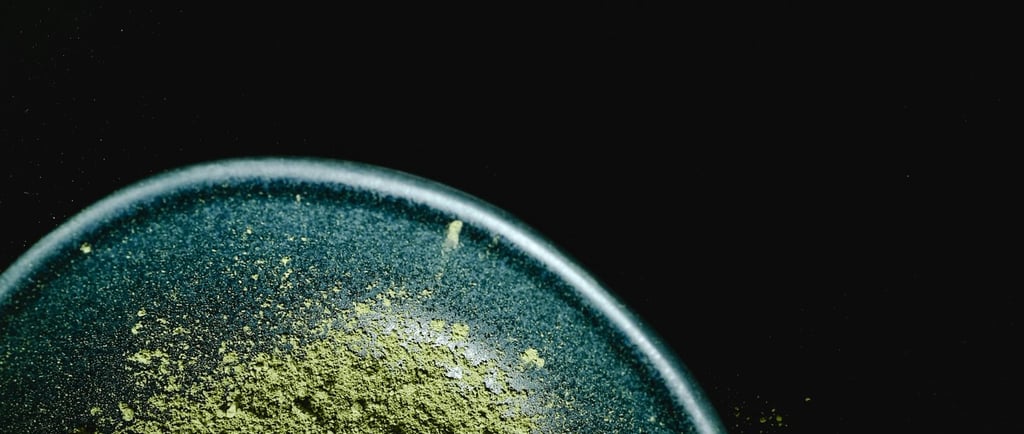The Kratom Controversy: A Naturopathic Perspective
WELLNESS


The Holistic Benefits of Kratom: Returning to the Root
In recent years, kratom has received a lot of attention, though not all of it has been fair or fully informed. While much of the coverage has focused on worst-case scenarios involving the use of high-potency extracts, the true story of kratom is far more nuanced, and deeply rooted in holistic traditions.
At its core, kratom is a plant that has supported human wellness for centuries. When used with intention and respect, especially in its natural, whole-leaf form, kratom can offer a range of supportive benefits.
In this blog post, we aim to clear up some of the confusion surrounding the plant. It is our intention to illustrate the difference between traditional kratom tea (like what’s served at your local kava bar) and the more controversial extracts and isolates such as 7-Hydroxymitragynine, or 7OH.
What Is Kratom?
Kratom (Mitragyna speciosa) is a tropical evergreen tree native to Southeast Asia, particularly Thailand, Indonesia, and Malaysia.
For generations, local communities have used kratom leaves for its myriad of effects including energy, focus, pain relief, and relaxation. Whether chewed fresh or brewed into tea, the plant has long been a tool for balance. Traditionally, it was valued for its ability to ease the body, calm the mind, and uplift the spirit
Kratom use was often part of daily life, embedded in culture and community.
Alkaloids in Balance: Why Natural Kratom Matters
Kratom leaves contain dozens of alkaloids, but the two most talked-about are:
Mitragynine – The dominant alkaloid in most kratom strains; believed to contribute to stimulation, pain relief, and mood support.
7-OH-Mitragynine (7-hydroxymitragynine) – A much more potent alkaloid present in only trace amounts in raw leaf but heavily concentrated in many modern extracts.
Traditional kratom tea has a balanced alkaloid profile, with mitragynine leading the way and only a whisper of 7-OH.
This keeps the effects gentle, sustained, and supportive, without the intense spikes or crashes associated with concentrated forms.
Extracts vs Tea: A Crucial Distinction
A lot of the controversy around kratom stems from products that do not reflect the traditional plant.
Kratom Tea is brewed from powdered or crushed leaves. The tea, which is often served in kava bars and ethnobotanical lounges, has a gentle onset, and gradual effects. Many kratom users find that enjoying the tea in moderation promotes mental clarity and overall well-being, without overstimulating the body.
Kratom Extracts on the other hand, are highly concentrated and often chemically altered. These may contain isolated 7-OH-mitragynine at levels much higher than you would find in nature. While they can have strong effects, they also carry a higher risk of tolerance, dependence, and adverse side effects.
Unfortunately, much of the negative press around kratom comes from these isolated products, not the whole-leaf teas which are rooted in traditional, holistic use.
Holistic Benefits of Traditional Kratom Use
When consumed in its natural form, especially as a tea, kratom can be a supportive part of a holistic wellness routine.
Below are some benefits of drinking kratom tea.
1. Natural Energy & Motivation
Lighter strains (such as white) in small amounts may gently increase focus and stamina. The effects are similar to a strong cup of yerba mate, without the jittery edge of caffeine.
2. Relaxation & Emotional Balance
Red or balanced strains are often chosen for their calming qualities. Many people report the quieting of anxious thoughts, a relaxed body, and a more centered emotional state.
3. Physical Ease
Kratom tea may offer natural support for discomfort, ideal for those dealing with minor aches or seeking alternatives to NSAIDs or prescription painkillers.
4. Mind-Body Connection
Traditional use encourages intentional awareness. The effects don’t dominate the mind but gently support it, allowing for deeper embodiment and presence.
5. Alcohol Alternative
Many people turn to kratom tea as a non-alcoholic option for socializing and unwinding. It can enhance mood and relaxation without the hangover or cognitive fog.
Responsible Use: Intention Is Everything
Holistic use means mindful use. Even natural kratom, when overused or misunderstood, can lead to dependence or loss of effectiveness. Here are a few guiding principles:
Start low and slow.
Stick with whole-leaf preparations like teas, not extracts.
Take regular breaks to reset your system.
Source your kratom from reputable, transparent vendors or kava bars.
Use it with clear intention, not habit.
Our Mission to Revive the Use of Traditional Kratom
Shanti Kava is St. Augustine’s sanctuary for wellness and community. We prioritize offering kratom the way nature intended: authentic, nourishing, and crafted with care.
We serve whole-leaf tea to provide a pure, natural experience that aligns with our commitment to holistic well-being.
Our environment is designed to cultivate relaxation, meaningful connection, and community. Every detail, from the botanicals we use to the warm, inclusive atmosphere we create, reflects our dedication to sustainable practices and ethically sourced ingredients.
Kratom is freshly brewed and often blended with other supportive herbs, providing a balanced and intentional experience for our guests.
Our knowledgeable staff are always available to guide newcomers, ensuring a welcoming environment where everyone can unwind, connect, and thrive.
If you're kratom-curious, visiting Shanti Kava offers a safe and nurturing space to explore its benefits and become part of a community that values relaxation, connection, and well-being.
In Conclusion: Back to the Root
Kratom isn’t a miracle cure or a villain. It’s a plant, and like all powerful herbs, it deserves respect and understanding. When used in its natural form, with awareness and moderation, kratom can offer a range of holistic benefits: from enhanced focus and calm, to gentle pain relief and emotional balance.
If you're looking to explore natural alternatives for wellness, or simply want to understand what kratom really is, start with tea. Start slow. Stay curious. And most importantly, stay connected to your body and your intentions.
Want to try traditional kratom tea for yourself?
Visit us at Shanti Kava 525 FL-16 Suite 130, 32084, or feel free to drop your questions below, we’re here to help guide your journey.


